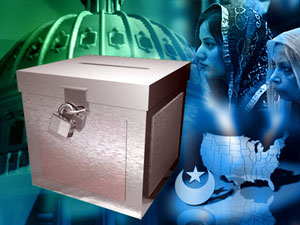
NEW YORK – In an electoral campaign system tactically dominated by “niche politics,” major candidates for their party’s presidential nominations are running as fast as they can from one potentially influential constituency: the American Muslim community.
The reason for the politicians’ flight from this constituency of seven million is the fear of being seen as “soft on national security.”
Arguably, presidential candidate John McCain, the “straight-talking” Republican senator from Arizona, has become the poster child for the denigration of American Muslims. In response to a question about the possibility of a Muslim’s running for president, Mr. McCain said his faith probably offers better spiritual guidance than that of a follower of Islam.
“Since this nation was founded primarily on Christian principles, that’s a decision the American people would have to make, but personally, I prefer someone who I know who has a solid grounding in my faith,” he said in a speech on the campaign trail.
Mr. McCain, and his rival, Mike Huckabee, an evangelist Baptist minister and three-term governor of Arkansas, have arguably been the most outspoken against Muslims. But the theme appears to be tacitly embraced by virtually all White House hopefuls of both parties.
In Michigan, during the Republican primary contest, one American Muslim businessman said, “They’re all falling over each other to demonize Muslims and Islam. They’re trying to appeal to the power of prejudice and hate … and it’s brainless. Everybody knows we have a problem with terrorism. Let’s focus on how to deal with it, instead of focusing on a faith or a people.”
This view is shared by many in Michigan’s sizable Muslim and Arab-American communities. Local Muslims feel under siege as candidates scramble to bolster their national security credentials with words Muslims say slander their religion.
In a recent TV ad for former New York mayor Rudy Giuliani, images of angry Muslim men and women appear on screen with a voice-over warning of “a people perverted.”
Most American Muslims say they have no problems with talk of fighting terrorists. But they find Republican candidates consistently equating Islam with terrorism and crossing the line into bigotry.
Among candidates, the single exception appears to be Dennis Kucinich, a Democratic congressman from Ohio who was formerly mayor of Cleveland. He has reached out to American Muslims by including mosques in his campaign itinerary. But his chances of winning his party’s nomination are judged to be less than nil.
According to Ibrahim Hooper, strategic communications director of the Council on American-Islamic Relations (CAIR), an advocacy group for Muslims in North America, “It should be clear to any candidate that American Muslims are a key group of voters who defy simplistic labeling and maintain an independent streak that should be taken into account by all those running for public office.”
But this is not happening, said Corey Saylor, CAIR’s national legislative director. “There is virtually no sign of outreach by candidates for the presidential nomination.” The Washington-based nonprofit organization recently launched a voter education program with its website.
Mr. Saylor said, “American Muslims are basically conservative. They voted for George W. Bush in 2000 but switched to John Kerry in 2004, because they felt their civil rights and liberties were under attack” by politicians who equated Islam with terror.
The exact number of American Muslim voters is not known. But Mr. Saylor believes a conservative estimate can be found in the 400,000-strong database CAIR developed for a 2006 attitude survey of this constituency.
CAIR said these days American Muslims are viewed as potential swing voters in key battleground states such as Florida, Michigan, Illinois, Ohio, Pennsylvania and Wisconsin.
The 2006 survey profile reported that American Muslims are young, highly educated, professional, middle class, family-oriented and religiously diverse. The survey found that there was no clear majority in party membership: 42 percent said they considered themselves Democrats; 17 percent said they were Republicans; 28 percent said they did not belong to any party.
The survey also showed that Muslim voters believe anti-U.S. sentiment in the Muslim world is a serious problem–one that can only benefit from the unique perspective and input of American Muslims.
But Samer Shehata, a professor of Arab Politics at Georgetown University, thinks that American Muslims, like many other U.S. voters, will eventually make their choices. He expects that a large percentage of American Muslims are supporters of Democratic Senator Barack Obama for several reasons: First, most American Muslims are Black; second, Sen. Obama is viewed as more fair and balanced when it comes to the Palestinian-Israeli conflict than Hillary Clinton, for example; third, Mr. Obama was against the Iraq war from the very beginning, unlike Mrs. Clinton.
(Distributed by the Global Information Network and Inter-Press Service.)












